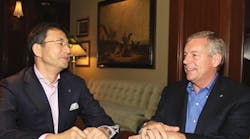Following quickly on the heels of the early November announcement regarding the acquisition of Goodman Global Group, Inc., by Daikin Industries, Ltd. (bit.ly/Daikin_Goodman), top executives from both firms sat down with members of the trade press to discuss what this means to both companies, their customers, and the HVAC industry. Takeshi Ebisu, senior executive officer of Daikin, and Dave Swift, chief executive officer and president of Goodman met with Contracting Business.com Editorial Director Mike Weil in Houston.
Dave Swift began the meeting by describing how “complimentary” the merger was. He says that it wasn’t focused only on price/cost synergies, but on complimentary manufacturing and technology.
“If you think about it,” Swift says, “Daikin is a $14.5 billion company with relatively little presence in the U.S. On the other flip side, Goodman is $2 billion company with hardly anything outside of North America.”
He adds that Goodman has all of its manufacturing here in the U.S., where Daikin has some (the McQuay group and Daikin USA), but none of their products such as the variable refrigerant flow units (VRF) or mini-splits. From his perspective, he says that Goodman sees the opportunity to have access to “terrific Daikin technology.”
“Daikin is a world leader in high efficiency technology and next generation refrigerants. This merger gives Goodman the opportunity to take leadership technology from around the world, infuse that with our low-cost, U.S.-based manufacturing capability, and our broad distribution network. This is, in my opinion, the best strategic outcome for Goodman,” Swift says.
Speaking through an interpreter, Takeshi Ebisu, from Osaka, Japan added that one of Daikin’s goals is to become a stronger player in the U.S. market. Combined with what he calls the “greening” of the U.S. HVAC market, Daikin brings products with superior environmental performance, like their inverter-driven compressor and heat pump system.
The Daikin acquisition of Goodman signifies a new start for Goodman. The Goodman/Amana brands will both remain
active in the HVAC marketplace.
He adds that the Daikin acquisition of Goodman doesn’t signify the end, but rather a new start for Goodman. He explained that the Goodman/Amana brands would both remain active in the HVAC marketplace.
Swift explains that from a branding standpoint, the Goodman philosophy has always been that the contractor-dealer IS the brand. “Our research data indicates that very few homeowners have a connection with a manufacturers brand. Our view, as a result, is that the Goodman brand isn’t as important to homeowners as the connection with their local HVAC dealer," Swift says. "But we’ve found that it DOES mean quite a bit to our contractor customers as they assess the brand options for their business success. Mr. Ebisu and Daikin agree with this business strategy and report no intention of changing Goodman’s philosophy as a result of the acquisition.”
Ebisu, who is a senior executive officer and a member of the board for Daikin Industries says, “Our plan is to offer Daikin products to the American market using the best distribution network that Goodman has. Currently, Daikin is supplying our products to America by importing them from factories in Japan or Asia. To better respond to customers' requirements and better serve local American markets, our goal is to use Goodman factories to produce Daikin brand products.” Swift points out that this means instead of off-shoring jobs, which has been the case in many foreign acquisitions of American companies, Daikin’s plan is to create more jobs here in the U.S. For HVAC contractors, this will greatly improve product availability.
Ebisu says, “Our principle aspiration is to be firmly rooted and anchored in the North American market, and be recognized as a local company. To do that, we believe it's important that we do our best to increase the employment of the local people and contribute to the local community.”
One very interesting aspect to all of this is that Daikin is doing something that very few Japanese companies do after an acquisition: they’re retaining the Goodman senior management team. He calls this part of Daikin’s “people-centered management philosophy.” It is a global objective. “We believe that people are one of the greatest assets of any company and we often obtain truly talented management through our acquisitions. Such is the case with Goodman, with Mr. Swift and his team,” states Ebisu.
According to Swift, the reaction to the acquisition among their current distributors and HVAC contractor customers has been very positive. “If Goodman can extend the full breadth of the combined offering over our broad distribution, we will have the opportunity to maintain loyalty from current dealer contractors and become more attractive to others. And that segues into the training requirement. Goodman has always been heavily involved with training and NATE certification and that will not only continue, but will grow with the addition of the Daikin brand products.”
Swift concludes the interview by saying that the reason Goodman has achieved the success that it has is because their focus is only on one industry — HVAC. “That's all we do,” he says. “If we're not successful in HVAC, we won’t succeed as a company. The benefit of our relationship with Daikin is that they have exactly the same view. They’re an HVAC company. Having that aligned focus suggests that, for our customers, the contractors, we have to be successful.”








